External links
![]() Works by or about William Macdonald at Wikisource
Works by or about William Macdonald at Wikisource
William Macdonald (July 31, 1863 - December 15, 1938) was an American historian and journalist.
William Macdonald was from Providence, Rhode Island. [1] He attended Harvard University, where he received a Bachelor of Arts in 1892. In 1895 he received an honorary doctorate from Union College. Macdonald's first professorship was in history and economics at Worcester Polytechnic Institute from 1892 to 1893, and he then went to Bowdoin College from 1893 to 1801 as a professor of political science and history. From 1901 to 1917 Macdonald was a professor of history at Brown University. [1] Macdonald was elected a member of the American Antiquarian Society in 1902. [2] In 1917 Macdonald resigned from Brown while on sabbatical in France. While in France he became a special foreign correspondent for The Nation and was an associate editor for the paper from 1918 to 1920. Macdonald was also an editorial writer for The Freeman and Commercial and Financial Chronicle . Macdonald gave lectures at the University of California in 1917 and 1918, and gave lectures as a visiting professor at Yale University from 1924 to 1926.
MacDonald died on December 15, 1938, in New York City.
![]() Works by or about William Macdonald at Wikisource
Works by or about William Macdonald at Wikisource
Sir Charles Harding Firth was a British historian. He was one of the founders of the Historical Association in 1906. Esmond de Beer wrote that Firth "knew the men and women of the seventeenth century much as a man knows his friends and acquaintances, not only as characters but also in the whole moral and intellectual world in which they lived."

Sir Paul Gavrilovitch Vinogradoff was a Russian and British historian and medievalist. He was a leading thinker in the development of historical jurisprudence and legal history as disciplines.
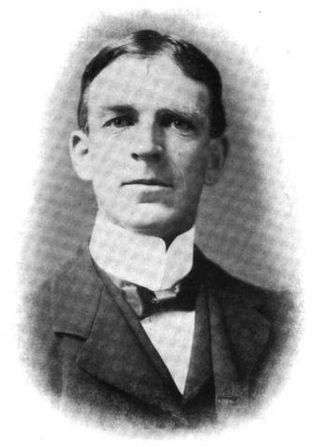
William Wallace Campbell was an American astronomer, and director of Lick Observatory from 1901 to 1930. He specialized in spectroscopy. He was the tenth president of the University of California from 1923 to 1930.

Elisha Benjamin Andrews was an American economist, soldier, and educator.

Jared Sparks was an American historian, educator, and Unitarian minister. He served as President of Harvard College from 1849 to 1853.

Sir Robert Stawell Ball was an Irish astronomer who founded the screw theory. He was Royal Astronomer of Ireland at Dunsink Observatory.

Rufus Matthew Jones was an American religious leader, writer, magazine editor, philosopher, and college professor. He was instrumental in the establishment of the Haverford Emergency Unit. One of the most influential Quakers of the 20th century, he was a Quaker historian and theologian as well as a philosopher. He is the only person to have delivered two Swarthmore Lectures.

James Ford Rhodes, was an American industrialist and historian born in Cleveland, Ohio. After earning a fortune in the iron, coal, and steel industries by 1885, he retired from business to devote time to historical research. He wrote a seven-volume history of the United States from 1850, initially published from 1893 to 1906 with an eighth volume added in 1920. Another book, A History of the Civil War, 1861–1865 (1918), won the second-ever Pulitzer Prize for History.

Edward Alsworth Ross was a progressive American sociologist, eugenicist, economist, and major figure of early criminology.
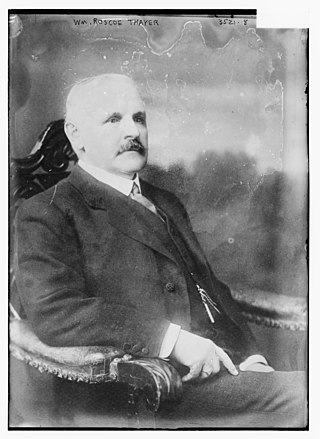
William Roscoe Thayer was an American author and editor who wrote about Italian history.

Peter Hume Brown, FBA was a Scottish historian and professor who played an important part in establishing Scottish history as a significant academic discipline. In addition to teaching and writing, he spent 16 years as editor of the Register of the Privy Council of Scotland, and served as Historiographer Royal.
Godfrey Rathbone Benson, 1st Baron Charnwood, was an English author, academic, Liberal politician and philanthropist.
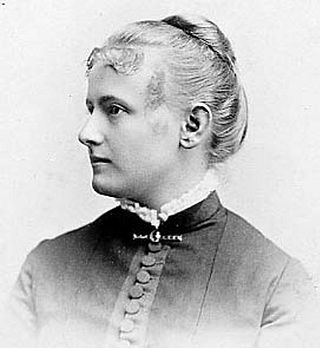
Julia Vida Dutton Scudder (1861–1954) was an American educator, writer, and welfare activist in the social gospel movement.

Barrett Wendell was an American academic known for a series of textbooks including English Composition, studies of Cotton Mather and William Shakespeare,A Literary History of America,The France of Today, and The Traditions of European Literature.
Worthington Chauncey Ford was an American historian, archivist and editor of many collections of documents from early American history. He served in a variety of government positions: first, as the chief of the Bureau of Statistics for the U.S. Department of State, from 1885 to 1889, then at the U.S. Department of Treasury, 1893–1898, then as chief of the manuscripts division at the Library of Congress from 1902–1908. From 1909 to 1929 Ford was the editor of publications of the Massachusetts Historical Society, which had elected him a member in 1900. He also served concurrently as Librarian of the John Carter Brown Library at Brown University from 1917 to 1922.
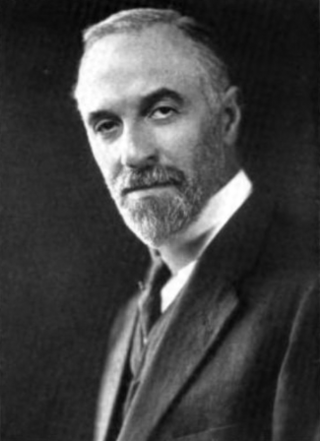
Julius Oscar Stieglitz was an American chemist of German Jewish origin. He was a teacher and organic chemist with a major interest in pharmaceutical and medicinal chemistry. He is known for the Stieglitz rearrangement, a rearrangement reaction in organic chemistry which commonly involves the formation of imines from hydroxylamines through a carbon to nitrogen shift, comparable to the key step of a Beckmann rearrangement.

George Park Fisher was an American theologian and historian who was noted as a teacher and a prolific writer.
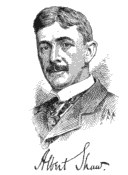
Albert Shaw was an American journalist and academic.

Roger Bigelow Merriman was an American historian and a practitioner of scientific historiography developed by German historians. He is known especially for his multivolume history of the Spanish Empire.
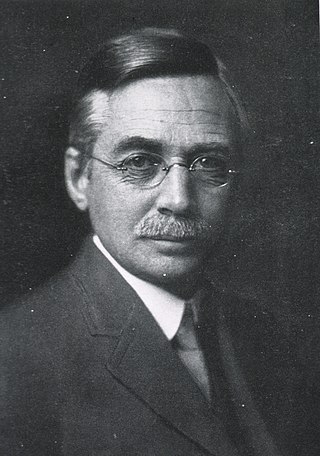
Ludvig Hektoen was an American pathologist known for his work in the fields of pathology, microbiology and immunology. Hektoen was appointed to the National Academy of Sciences in 1918, and served as president of many professional societies, including the American Association of Immunologists in 1927 and the American Society for Microbiology in 1929. He was the founding editor of the Archives of Pathology and Laboratory Medicine in 1926 and edited several other medical journals. He was knighted to the Order of St. Olav in 1929, and in 1933, he became professor emeritus of pathology at the University of Chicago. The Hektoen Institute for Medical Research—formerly the John McCormick Institute of Infectious Diseases—now bears his name.